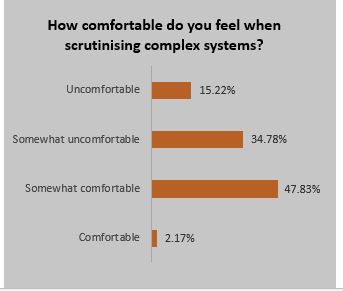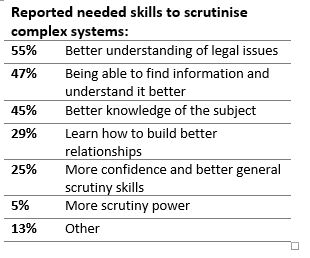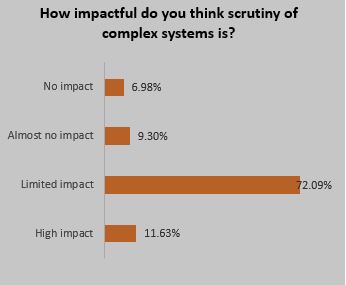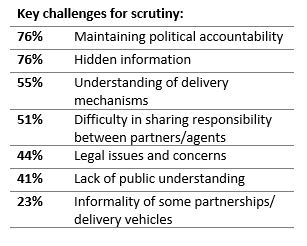Last year we held our national annual scrutiny conference which looked at the governance of complexity. Prior to the conference we ran a short survey to get views from councillors and officers about their practical experiences on managing scrutiny and governance in increasingly complex environment. The responses were illuminating, if not entirely surprising.
Over half of our respondents thought that the level of complexity had increased significantly, and a further third thought that it increased somewhat in the last ten years. Our own research backs this up. Since 2007 there has been 12 pieces of legislation that affect scrutiny, several major changes in service delivery models (CQC, Police Crime Commissioners and STPs are just a first few that come to mind), devolution has become a reality for some areas with new deals currently being discussed, and various joint scrutiny and partnership arrangements have emerged. In addition, all local authorities have had to deal with austerity, which in many places have amplified complexity, as councils seek novel solutions to managing services with reduced resources.
While there is broad agreement on the increased level of complexity, councillors’ views on scrutinising new complex delivery systems were split in half: 50% felt comfortable or somewhat comfortable scrutinising those new systems, while another 50% felt rather uncomfortable about it.


The discomfort mainly stems from a lack of understanding of new delivery vehicles and their legal foundations well enough. To so some extent this is a good news as these issues can be dealt with relatively simply, with sufficient support for scrutiny from the executive and officer side. It is also a positive development, that only 5% think that the key problem lies in the lack of formal scrutiny powers, and only 13% cited other issues such as political climate and lack of finances as a barrier to scrutinising complex structures.
While this news is reassuring, the perceptions on the impact of complex system scrutiny are significantly less positive. The majority of councillors and officers thought that scrutiny of complex system has a limited impact.


The key obstacles to more impactful scrutiny were political accountability, knowledge about the new delivery vehicles and clarity about the responsibilities of each partner, difficulty of explaining new vehicles to residents and differentiating between formal and informal ways of doing scrutiny.
What we can be sure about is that complexity is here to stay – the way councils operate and deliver services will be with us for the foreseeable. The challenges local government and public services more generally are increasingly complex, and so unsurprisingly, the solutions are too. The challenges to governance, scrutiny and accountability remain.
Results from our survey do point to a road map of how some of these challenges can be overcome. Better information, more guidance (from organisations like us) and crucially a commitment from the executive and officers to ensure that scrutiny councillors have access to the information they need to ensure that vital democratic line of sight.

 All news
All news